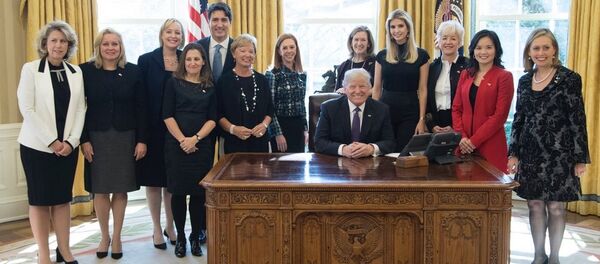Regardless of the outcome of the war of words, Sweden's public image has taken a serious beating. In mainstream and social media, Sweden is increasingly more often portrayed as a problem country, which may affect tourism to Sweden, as well as the country's trade and business opportunities, Swedish experts have predicted.
Ok, some facts about #Sweden
— Swedish MFA (@SweMFA) February 23, 2017
No. 1 pic.twitter.com/wC2dftdnaF
"We depend on the global image of Sweden," Olle Wästberg, a politician and former Swedish Consul General in New York, told the Swedish daily Svenska Dagbladet. "Foreign capital must be prepared for long-term investments in Sweden, so that others are willing to do business with us. To achieve this, we must have a reputation [as being] a safe and prosperous country," he added.
While Hillary Clinton, Scandinavia's preferred candidate in the 2016 US presidential election, lauded Sweden's social security system with its reputedly generous parental leave, Donald Trump chose to stress Sweden's negative side, which manifests in burgeoning crime, nascent extremism, the emergence of violent ghettos and widening social gaps. According to Wästberg, this image also happens to occur in right-leaning media, which liberal Sweden sees as its natural enemy.
"This can have long-term significance for Sweden. Anything an American President says gets stuck," Olle Wästberg said.
A similarly negative scenario was painted by Henrik Selin, the head of the Swedish Institute, a Swedish government agency tasked with promoting the country's interests abroad and spreading information about Sweden. According to Selin, the popular picture of Sweden has been affected by the negative coverage.
Ok, some facts about #Sweden
— Swedish MFA (@SweMFA) February 23, 2017
No. 4https://t.co/moLJZGH8BJ pic.twitter.com/v49lVtZItl
"Of course it can affect people's immediate elections, such as their inclination to travel to Sweden. Especially those who believe in this kind of reporting," Selin said, suggesting it was still too early to gauge the long-term effects.
"There are two reasons why it can affect the image of Sweden. Firstly, because it affects tourism, trade and our business opportunities. Secondly, because Sweden does not want to become a battering ram in other players' political agendas," Selin said.
Since the mid-1980s, Sweden has had a positive trade balance and is largely dependent on trade with other countries. The US has traditionally been one of Sweden's key trade partners, accounting for 91 billion SEK ($10bln) in exports in 2015, according to Statistics Sweden.
Never miss a story again — sign up to our Telegram channel and we'll keep you up to speed!





